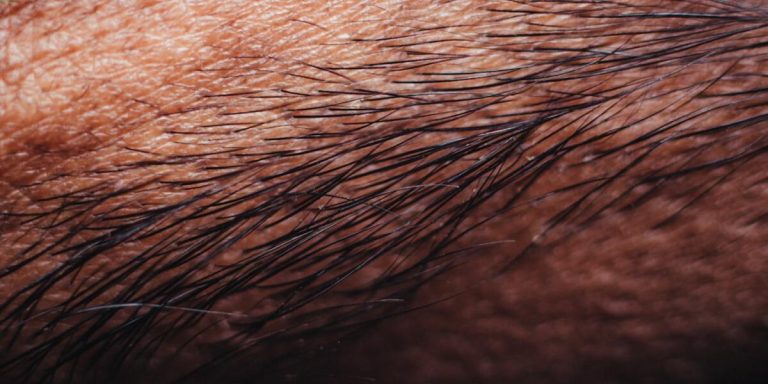Does Syphilis Cause Hair Loss? Uncovering the Truth
Does syphilis cause hair loss? This is a frequent question circulating the internet, generating confusion among many. The relationship between sexually transmitted diseases and hair loss isn’t often discussed, leading to multiple misconceptions.
With this article, we aim to bring light on this topic from a standpoint of scientific evidence.
Syphilis has been recognized as one of the oldest known STDs with severe implications if untreated. Yet its influence over our overall health is not fully understood by everyone — let alone its potential connection with baldness or thinning hair conditions. Through careful examination into research studies and medical anecdotes, we intend to uncover the truth behind whether syphillis contributes towards hair shedding in both men and women.
Did you know?
While it’s common knowledge that syphilis causes a multitude of symptoms, few know that in its secondary stage, the disease can result in hair loss. This occurs as patchy ‘moth-eaten’ alopecia primarily on the scalp and beard area.
Understanding Hair Loss: The Syphilis Connection
The term syphilis may bring up images of an ancient disease, but it’s far from extinct. In fact, recent data reveals a surge in cases globally. Interestingly enough, hair loss can be one of the symptoms connected to this infectious condition caused by the bacterium Treponema pallidum.
Although not commonly known as such because its manifestation varies per individual case and is somewhat rare.
Syphilis progresses through distinct stages if left untreated: primary, secondary, and tertiary. Each stage presents unique symptoms. Symptoms may include patchy hair loss during the secondary or latent phases (tertiary), typically starting 3-6 weeks after sores first appear. Hair can thin overall or fall out in small patches, a condition known as ‘syphilitic alopecia‘. This pattern of hair loss is unpredictable and sets it apart from other types like male pattern baldness, which follows predictable sequences.
Often overlooked, the connections between syphilis and hair loss stem from cultural stigmas surrounding sexually transmitted infections. These stigmas make sufferers hesitant to seek medical advice and treatment, aggravating their situation by allowing the infection to progress to levels where diverse complications can arise. Sudden, unexpected hair loss goes unnoticed until it is too late. We emphasize knowing the full range of potential issues—especially lesser-known ones—and focus on breaking down barriers and stigma associated with delayed diagnosis. At SoulPhany, we prioritize timely interventions and prevention for healthier, more optimal life experiences!
Signs and Symptoms of Syphilis-Related Alopecia
Alopecia, commonly known as hair loss can be a concerning symptom of syphilis. In fact, the query “does syphilis cause hair loss” appears frequently in online searches related to STDs and alopecia symptoms alike. Here is what you need to know about the signs and symptoms of Syphilis-Related Alopecia.
Syphilis-caused alopecia distinguishes itself from other types through unique patterns. You might notice circular or irregular-shaped patches of baldness scattered across your scalp – this phenomenon is often referred to as ‘moth-eaten’ baldness due its resemblance with moth-damaged fabric.
Another sign could be general thinning throughout your crown area rather than distinct bald spots appearing out-of-nowhere on your head-top.
It’s not just limited to the scalp though; eyebrows, beard areas for men or even eyelashes may also show similar patterned scarcity which indicate systemic disease like syphilic infection underneath.
Sometimes these skin sections where hair has fallen off turn into reddish rashes that are extremely itchy accompanied by sores after scratching excessively – another testament towards possible underlying Sexually transmitted diseases including Syphillis.
Besides external visible signals, internally too there would hints pointing at venereal malady presence via abrupt weight changes (either gain/loss without proportional diet/exercise modifications), sudden non-seasonal fever spikes alongside persistent lymph nodes swellings especially around neck region; all scream ‘potential bacterial infections’.
Diagnosing Hair Loss Due to Syphilis
To accurately diagnose hair loss due to syphilis, it’s crucial to understand the dynamics of this interplay. Hair loss is a common symptom in several stages of syphilis. Let’s delve into it.
Syphilis primarily manifests with skin rashes and sores but often progresses stealthily, leading to non-scarring alopecia—hair loss that does not lead to permanent baldness—an aspect frequently overlooked by many.
The telltale sign comes in the form of “moth-eaten” alopecia—a type of patchy hair loss named for its characteristic appearance resembling textile damaged by moths. This occurs frequently during secondary or latent phases when other symptoms like fever or weight change may also appear making diagnosis relatively easier.
Unlike most forms of alopecia, moth-eaten hair loss generally reverses once treatment commences. Therefore spotting these signs early can be instrumental in preventing further damage and ensuring quick recovery from both syphilis and induced hair loss.
Apart from physical examination physicians usually recommend blood tests including Venereal disease research laboratory (VDRL) test or Rapid plasma regain (RPR), Fluorescent treponemal antibody absorption (FTA-ABS) test among others for confirmation before beginning appropriate treatment targeting Treponema pallidum—the bacterium causing Syphilis.
Exploring Common Triggers for Hair Loss Beyond Infection
Hair loss can occur due to a variety of reasons and understanding these triggers is the first defense against this condition. An often overlooked but significant cause of hair loss could be underlying infections, one such being syphilis. Syphilis is a sexually transmitted infection which in its advanced stages may lead to numerous health issues including hair loss.
However, it’s crucial not to jump into hasty conclusions without thorough investigations when you notice unusual patterns of balding or thinning locks. Other common causes might include hormonal imbalances, stress factors or genetic predispositions which are usually considered as primary reasons for abrupt shedding sequences. In fact, conditions like alopecia areata can result from compromised immune responses but are frequently mistaken for infection-induced symptoms.
The relationship between bacterial & viral contagions and their impact on scalp wellbeing underscores the importance of medical consultations upon noticing worrying signs linked with potential hair damage scenarios. Keep in mind that while syphilis might indeed trigger substantial mane reduction episodes if left untreated; various other diseases also bear similar hallmark traits so making any assumptions before clinical validation would be unwise.
Hormonal Imbalances and Genetic Factors in Balding
Hormonal imbalance and genetic factors play significant roles in hair loss. This stark reality is often seen in both men and women, signifying the importance of understanding these elements better.
When we talk about hormonal imbalances as a cause for hair loss, one hormone commonly comes under scrutiny – dihydrotestosterone (DHT). DHT is derived from testosterone but has more potent effects on your follicles. For people genetically prone to balding, elevated levels of DHT may harm their hair follicles causing them to shrink over time; this leads to thinner strands that eventually break off or fall out.
Even though not an actual hormone itself, Cortisol – also known as ‘the stress hormone’, can indirectly lead to hormonal imbalances affecting our locks’ health too. High cortisol levels due to chronic stress might upset the body’s natural equilibrium leading potentially even trigger alopecia areata, where clumps of hair start falling out abruptly.
On another note: there exists a question many have asked recently- “does syphilis cause hair loss?”. Yes indeed! Syphilis stands guilty as charged because it can cause patchy bald spots in its secondary stage along with other symptoms like rashes or sore throats depending upon individual immune responses!
Stress, Nutrition, and Environmental Culprits
Today’s fast-paced lifestyle makes it hard to keep up on the health front as stress, poor nutrition habits and environmental factors often slip us by unnoticed. These silent culprits pose a significant threat not just to our overall wellness but also specifically lead to hair loss.
Stress manifests physically in several ways, including accelerated hair loss. Telogen effluvium, a common condition, occurs after intense emotional or physical strain. In these periods, your body prioritizes recovery over non-essential functions such as maintaining healthy hair growth. One may wonder if syphilis causes hair loss; while less severe cases can reverse with time and care, chronic stress might require specialized treatments.
The nutritional element plays an equally impactful role behind those thinning tresses because undernourishment drastically hampers quality new follicle generation while worsening existing ones’ states due to nutrient deprivation. Is lack of protein causing your locks’ volume drop? Or could insufficient iron be dulling their natural shine?
Environmental exposure isn’t left far behind either – from harsh chemicals found commonly in hairstyling products that weaken individual strands over usage cycles through scalp-damaging pollutants air-borne outdoors plus indoors alike causing noticeable fallouts seen especially during bath-time or brushing sessions daily – all add collectively into making this seemingly cosmetic problem potentially silently symptomatic for deeper undertones too!
Treatment Options for Managing Hair Loss from Syphilis
Treating hair loss resulting from syphilis requires a two-pronged approach – combating the underlying infection and managing any accompanying alopecia. Early detection and treatment of syphilis can prevent many complications, including hair loss.
Once you’ve dealt with the core infection through proper medication prescribed by your healthcare provider, attention shifts towards tackling related symptoms such as hair thinning or bald patches appearing on your scalp caused by what’s known as ‘syphilitic alopecia’. This situation brings us to an array of modern-day solutions available in 2023 specially catered at providing relief from various forms of Hair Loss Disorders.
Today’s markets provide several clinical treatments aimed at stimulating regrowth or slowing down further progressions like Minoxidil-based topical applications approved by FDA; Finasteride oral tablets are also gaining popularity due its success rate among users suffering male pattern baldness.
Antibiotic Therapies for Treating the Underlying Infection
The connection between syphilis and hair loss might come as a surprise to many. In certain cases, syphilis may lead to patchy or diffuse thinning of the hair, which is often temporary but certainly distressing for the individuals affected by it. So how does one manage “does syphilis cause hair loss”?
Foremost in our treatment options arsenal are antibiotic therapies designed specifically for treating the primary infection – Syphilis.
Penicillin remains at the forefront when dealing with this issue. This tried-and-true medication has been used effectively since World War II era for halting not only progression but also reducing lingering symptoms like potential baldness spots associated with secondary-stage syphilis.
But what happens if you’re allergic to penicillin? Worry not because there are alternatives available such as doxycycline and azithromycin that can be administered instead of penicillin under medical supervision.
Once antibiotics start combating your Syphillis infection from within, hairs generally begin regrowth on treated patches naturally over time — though patience will play a key role here due its gradual nature.
A significant aspect worth mentioning regarding these pharmaceutical interventions is their prescription structure—they should never be self-administered without professional guidance owing health complications they could trigger misuse case scenarios.
Restorative Practices to Promote Scalp Health and Regrowth
Hair loss is an unfortunate side effect of syphilis. Does syphilis cause hair loss? The answer is unequivocally yes, and it’s a symptom that can manifest in any stage of the disease.
But take heart; there are effective treatment options available to manage this condition.
The first step towards scalp restoration starts by treating the root cause – Syphilis itself. In 2023, penicillin remains the number one prescribed medication for its treatment from healthcare professionals worldwide.
After successfully eradicating the infection, you might notice improvement in your hair condition. Nevertheless, to achieve complete recovery, give additional attention to promote healthy regrowth. Consider these three proven restorative practices:
1) Nourishing Your Scalp Internally: Maintaining a balanced diet goes a long way when addressing hair health post-syphilis treatment. Incorporate more protein-rich foods like eggs or lean meat into your meals alongside minerals such as Zinc found predominantly in seafood and nuts.
2) Topical Treatments: Over-the-counter products containing ingredients like Minoxidil could help stimulate follicles for new growth while protecting existing strands against future shedding caused by damage unknowingly left behind after fighting off syphilitic bacteria.
Conclusion
In wrapping up, knowing “does syphilis cause hair loss?” adds another piece to the intricate puzzle of understanding what factors contribute to hair loss. Not only does it highlight how interconnected our body systems are, but also that maintaining general health can have surprising benefits for your locks.
We encourage you not just to stop here; continue exploring other articles on our website and delve into various aspects of ‘Hair Loss Causes’. Knowledge is power – particularly when applied towards preserving those precious strands on your head!







